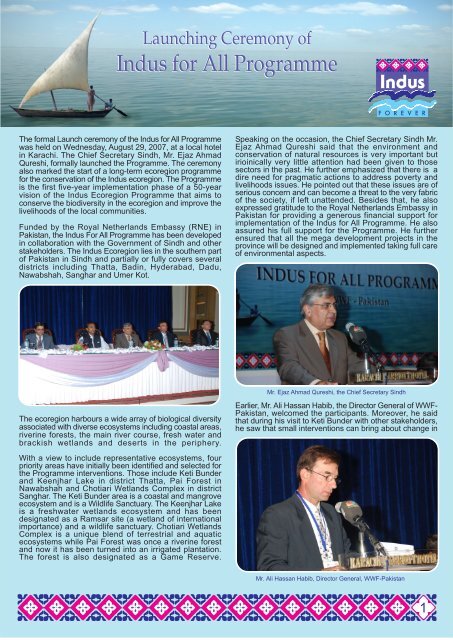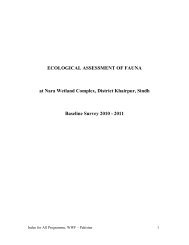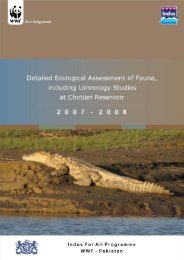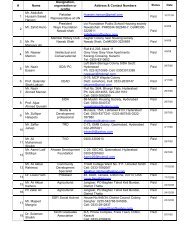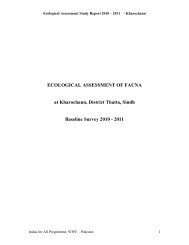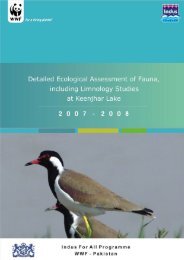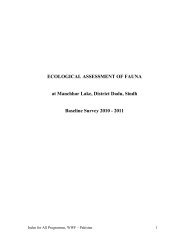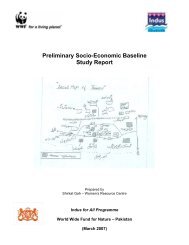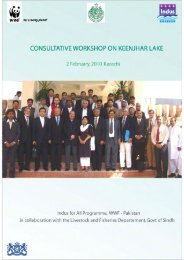Indus for All Programme Indus for All Programme
Indus for All Programme Indus for All Programme
Indus for All Programme Indus for All Programme
Create successful ePaper yourself
Turn your PDF publications into a flip-book with our unique Google optimized e-Paper software.
The <strong>for</strong>mal Launch ceremony of the <strong>Indus</strong> <strong>for</strong> <strong>All</strong> <strong>Programme</strong><br />
was held on Wednesday, August 29, 2007, at a local hotel<br />
in Karachi. The Chief Secretary Sindh, Mr. Ejaz Ahmad<br />
Qureshi, <strong>for</strong>mally launched the <strong>Programme</strong>. The ceremony<br />
also marked the start of a long-term ecoregion programme<br />
<strong>for</strong> the conservation of the <strong>Indus</strong> ecoregion. The <strong>Programme</strong><br />
is the first five-year implementation phase of a 50-year<br />
vision of the <strong>Indus</strong> Ecoregion <strong>Programme</strong> that aims to<br />
conserve the biodiversity in the ecoregion and improve the<br />
livelihoods of the local communities.<br />
Funded by the Royal Netherlands Embassy (RNE) in<br />
Pakistan, the <strong>Indus</strong> For <strong>All</strong> <strong>Programme</strong> has been developed<br />
in collaboration with the Government of Sindh and other<br />
stakeholders. The <strong>Indus</strong> Ecoregion lies in the southern part<br />
of Pakistan in Sindh and partially or fully covers several<br />
districts including Thatta, Badin, Hyderabad, Dadu,<br />
Nawabshah, Sanghar and Umer Kot.<br />
The ecoregion harbours a wide array of biological diversity<br />
associated with diverse ecosystems including coastal areas,<br />
riverine <strong>for</strong>ests, the main river course, fresh water and<br />
brackish wetlands and deserts in the periphery.<br />
With a view to include representative ecosystems, four<br />
priority areas have initially been identified and selected <strong>for</strong><br />
the <strong>Programme</strong> interventions. Those include Keti Bunder<br />
and Keenjhar Lake in district Thatta, Pai Forest in<br />
Nawabshah and Chotiari Wetlands Complex in district<br />
Sanghar. The Keti Bunder area is a coastal and mangrove<br />
ecosystem and is a Wildlife Sanctuary. The Keenjhar Lake<br />
is a freshwater wetlands ecosystem and has been<br />
designated as a Ramsar site (a wetland of international<br />
importance) and a wildlife sanctuary. Chotiari Wetlands<br />
Complex is a unique blend of terrestrial and aquatic<br />
ecosystems while Pai Forest was once a riverine <strong>for</strong>est<br />
and now it has been turned into an irrigated plantation.<br />
The <strong>for</strong>est is also designated as a Game Reserve.<br />
Launching Ceremony of<br />
<strong>Indus</strong> <strong>for</strong> <strong>All</strong> <strong>Programme</strong><br />
Speaking on the occasion, the Chief Secretary Sindh Mr.<br />
Ejaz Ahmad Qureshi said that the environment and<br />
conservation of natural resources is very important but<br />
irioinically very little attention had been given to those<br />
sectors in the past. He further emphasized that there is a<br />
dire need <strong>for</strong> pragmatic actions to address poverty and<br />
livelihoods issues. He pointed out that these issues are of<br />
serious concern and can become a threat to the very fabric<br />
of the society, if left unattended. Besides that, he also<br />
expressed gratitude to the Royal Netherlands Embassy in<br />
Pakistan <strong>for</strong> providing a generous financial support <strong>for</strong><br />
implementation of the <strong>Indus</strong> <strong>for</strong> <strong>All</strong> <strong>Programme</strong>. He also<br />
assured his full support <strong>for</strong> the <strong>Programme</strong>. He further<br />
ensured that all the mega development projects in the<br />
province will be designed and implemented taking full care<br />
of environmental aspects.<br />
Mr. Ejaz Ahmad Qureshi, the Chief Secretary Sindh<br />
Earlier, Mr. Ali Hassan Habib, the Director General of WWF-<br />
Pakistan, welcomed the participants. Moreover, he said<br />
that during his visit to Keti Bunder with other stakeholders,<br />
he saw that small interventions can bring about change in<br />
Mr. Ali Hassan Habib, Director General, WWF-Pakistan<br />
1
such remote areas. In this connection, he mentioned the<br />
initiatives taken under the <strong>Programme</strong> such as setting up<br />
windmill energy units and establishing a small hut to be<br />
used as a school <strong>for</strong> a small village of 20 households in a<br />
remote creek. He further elaborated that the main challenge<br />
is to maintain that change and to ensure that the windmills<br />
are providing energy and the schools are functioning well.<br />
He further revealed that there were some shocking<br />
realisations <strong>for</strong> him as during the visit he came to know<br />
that 60 years ago the Keti Bunder Town Council provided<br />
a loan to Karachi Council, because they were more<br />
prosperous then. He further elucidated that it gets oneself<br />
to think that the difference between the economic prosperity<br />
of our urban and rural areas is increasing. It needs to be<br />
balanced and we should look whether we are sharing the<br />
benefits of economic progress, he added. Agencies show<br />
that while Pakistan’s economy is improving, it is not filtering<br />
down to the needy ones.<br />
Mr. Fred Smiet, First Secretary, the Royal Netherlands Embassy<br />
Mr. Fred Smiet, the First Secretary of the Royal Netherlands<br />
Embassy in Pakistan, spoke about the different initiatives<br />
of the RNE in Pakistan. He said the main objective <strong>for</strong><br />
funding the <strong>Programme</strong> was to address the nexus between<br />
poverty and environment. He further elaborated that the<br />
preservation of the biodiversity is important but <strong>for</strong> RNE<br />
the most important aspect was to support the poor whose<br />
livelihoods are threatened by a number of factors, such as<br />
salinity, sea intrusion, and decline in fisheries. He hoped<br />
that the experience of Pakistan in this <strong>Programme</strong> could<br />
become an example <strong>for</strong> other countries and programmes<br />
of similar nature.<br />
Furthermore, Dr. Ghulam Akbar, the Director of the <strong>Indus</strong><br />
<strong>for</strong> <strong>All</strong> <strong>Programme</strong>, introduced the <strong>Programme</strong> and its<br />
Dr. Ghulam Akbar, Director <strong>Indus</strong> <strong>for</strong> <strong>All</strong> <strong>Programme</strong><br />
objectives adding that the long-term <strong>Indus</strong> Ecoregion<br />
<strong>Programme</strong> was <strong>for</strong> the conservation and poverty-alleviation<br />
in the <strong>Indus</strong> Ecoregion. He also said that the <strong>Indus</strong> Ecoregion<br />
is amongst the 40 most significant ecoregions in the world.<br />
Out of the five ecoregions found in Pakistan, it is the only<br />
ecoregion that lies fully within the borders of the country,<br />
while the others are trans-boundary. He further in<strong>for</strong>med<br />
the audience that the ecoregion consists of a diversity of<br />
ecosystems ranging from coastal and freshwater wetlands<br />
to riverine <strong>for</strong>ests and deserts which provide habitat to<br />
some important species of fauna and flora.<br />
Mr. Ghulam Sarwar Khero, Additional Chief Secretary<br />
(Development), Planning & Development Department,<br />
Government of Sindh also spoke on the occasion. Besides<br />
highlighting the linkages and opportunities between the<br />
<strong>Indus</strong> <strong>for</strong> <strong>All</strong> <strong>Programme</strong> and Sindh Vision 2030, he also<br />
spoke about the decline in the natural resources of the<br />
ecoregion. Speaking about alternative sources of energy,<br />
he appreciated the recent initiative of WWF-Pakistan to set<br />
up windmill energy units in the remote areas of Keti Bunder.<br />
He in<strong>for</strong>med the audience that the Government of Sindh<br />
has provided 18,000 acres of land to the Alternative Energy<br />
Department, Government of Pakistan <strong>for</strong> wind power plants.<br />
Mr. Ghulam Sarwar Khero, Additional Chief Secretary (Dev.),<br />
P & D Department, Government of Sindh<br />
Prior to the launching ceremony, a team of around 30<br />
members from WWF-Pakistan, Government of Sindh, and<br />
media visited Keti Bunder, one of the priority areas of the<br />
<strong>Programme</strong>. The participants of the exposure visit interacted<br />
with the local people and assessed the ground situation.<br />
The team was also taken to the sites where the <strong>Programme</strong><br />
has installed two windmills in villages of Keti Bunder Taluka<br />
Mr. Ali Hassan Habib, Director General, WWF-Pakistan<br />
addressing community people at Keti Bunder<br />
2
as part of its alternative livelihood initiatives. One of the<br />
windmills was installed in a remote creek area. During the<br />
visit the windmills were <strong>for</strong>mally inaugurated by <strong>All</strong>ah Bux<br />
Kalhoro, Director General, Coastal Development Authority,<br />
Sindh.<br />
The Chief Guest taking keen interest in the art exhibition<br />
with Dr. Ghulam Akbar and Dr. Ahsan Qureshi.<br />
The inauguration ceremony was amalgamated with several<br />
other activities including launching of <strong>Indus</strong> Ecoregion<br />
<strong>Programme</strong>’s Website: www.<strong>for</strong>everindus.org, <strong>Programme</strong><br />
Sites’ In<strong>for</strong>mation Corners and an Art Exhibition. The art<br />
exhibition put on show paintings by the renowned wildlife<br />
artist, Dr. Ehsan Qureshi. In order to promote communitymade<br />
products, several stalls of the local handicrafts were<br />
also set up at the venue.<br />
One of the stalls set up on the occasion<br />
Over two hundred and fifty participants representing diverse<br />
stakeholder groups and organizations, including prominent<br />
media agencies attended the event. The event was an<br />
effective means of launching some vital components of<br />
the <strong>Programme</strong>. It is hoped that the launch ceremony of<br />
the <strong>Indus</strong> <strong>for</strong> <strong>All</strong> <strong>Programme</strong> will foster sound synergies<br />
between all the key stakeholders of the <strong>Programme</strong>.<br />
In order to promote <strong>Indus</strong> ecoregion and enhance<br />
understanding about the <strong>Indus</strong> <strong>for</strong> <strong>All</strong> <strong>Programme</strong>, a range<br />
of awareness and resource material was displayed and<br />
distributed among the participants on the occasion.<br />
WWF - Pakistan’s Staff members during the Launch Ceremony.<br />
<strong>Indus</strong> For <strong>All</strong> <strong>Programme</strong><br />
WWF - Pakistan<br />
<strong>Programme</strong> Management Unit<br />
606-607 Fortune Centre, Block-6 P.E.C.H.S.,<br />
Main Shahra-e-Faisal, Karachi.<br />
Tel: 021-4544791-2 Fax: 021-4544790<br />
Website: www.<strong>for</strong>everindus.org<br />
The <strong>Programme</strong> is funded by the<br />
Royal Netherlands Embassy in Pakistan<br />
3


